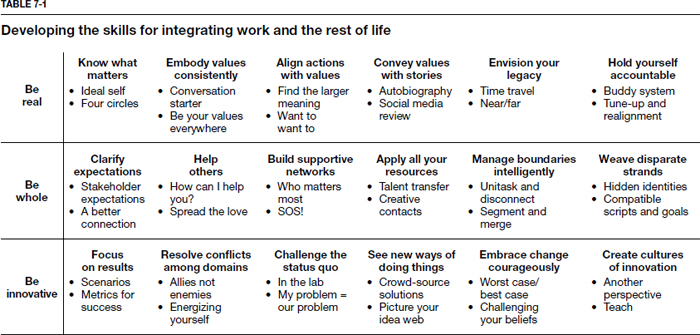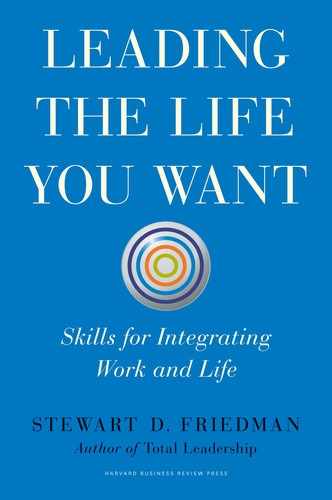7
The Worst Thing You Can Do
Don’t Fail to Grow
To lead the life you want, you’ve got to do something. Each of the people profiled in this book illustrates Total Leadership principles and the skills that animate them. In the preceding chapters, I’ve described particular episodes that demonstrate how they are leaders who are real, whole, and innovative. In the final chapter, I reflect on some of the larger lessons to be gleaned from the totality of their lives. But, for now, let me underscore something that is probably obvious to you: none of them stands still for long. They find ways to persist, despite whatever obstacles are before them, in moving ever closer to becoming the people they want to become. They make mistakes. They sometimes make people angry. But they are always doing something to try to make things better. They are constantly refining certain skills, learning to integrate various parts of their lives in ways that make them more effective.
Although you may not have the same talents, financial resources, or benefactors, you have the same potential to enhance your capacity to lead the life you want. Your life circumstances are yours alone, of course. And you might feel highly constrained. But I am certain that you do have discretion to act and, if you’re like most of the thousands I’ve coached over the years, you have more room than you think you have to try new things and learn new skills.
So let’s explore what the skills illustrated in these stories mean for you. I’m going to provide actions you can take to enhance your skills for integrating work and the rest of life. Informed and inspired by these six people, these skills will help you lead the life you want. All you have to do in the next three chapters is keep an open mind, stretch, and adjust.
I realize this means an investment of time in an already time-starved life. But I also know, from my own work and from research done by many other social scientists, that the only way to improve your capacity to lead is to practice. Leading your own life is a kind of performance, and you are the performer. The most revered performers never stop trying to become more skilled at their craft. They practice the fundamentals with rigor. They exercise the basics, doing them regularly to keep their technique sharp. They scour the field for best practices and incorporate them into their own repertoire.
This practice involves initiative, discipline, maintenance, and persistence. It is research and development, and it does cost. But it can be fun, too. Indeed, if you remain conscious of why you’re doing what you’re doing, I am sure that you will feel more purposeful, connected, and optimistic. And you will be more successful in pursuing what matters. You, too, can refine the skills that Tierney, Sandberg, Greitens, Obama, Foudy, and Springsteen have learned, each in his or her own way. But, again, this takes practice. Gleaned from the best research in applied psychology and human development, the practical suggestions in the next three chapters will help you develop your own repertoire of skills. I’ve tried to show how you can make these activities a fruitful part of your life in the days and weeks to come.
Some of these activities will be captivating and will produce tangible benefits right away. Others might not suit your fancy or meet your needs right now. Some people like to run around a park, and others prefer to ride a bicycle; some need to eat gluten-free, and others have to avoid nuts. You don’t have to do every one of these thirty-six exercises. And you’ll see that some are closely related and complementary. So pick and choose, adapt and innovate. But keep in mind that each activity has a distinct purpose.
Take a few minutes to think about which skills you need to develop most. It’s a good idea to go back to the assessment you did of your own skills in the Introduction to see which ones stood out as strengths you want to build on and which represented areas for improvement.
It’s also useful to review your observations about Tierney, Sandberg, Greitens, Obama, Foudy, and Springsteen. Consider what it was in these cases that stood out for you; how were these figures models for ways of thinking and acting? You don’t have to aspire to be any one of these textbook examples; you only have to learn from them. Doing these reviews should give you your own short list of skills to jump on first.
You’re going to be using some muscles that might not be in very good shape. As with a novice musician, your fingers may not be as supple, your sound not as beautiful as you’d like, at least not at first. That’s all right. Taking action to become a better performer—to become more of the person we want to become—involves learning. Learning requires mistakes and reflection on those mistakes. So prepare to do some thinking about yourself and your world. Accelerating your growth in a skill requires looking back as much as you can at what works and what doesn’t. You really cannot take intelligent new action toward important goals without looking back a little.
Developing Your Skills
Table 7-1 summarizes the exercises for developing each of the skills that bring to life the three principles of being real, being whole, and being innovative.

I’m now going to switch from Stew the professor to Stew the music coach. Ready? Let’s pick up our instruments!
